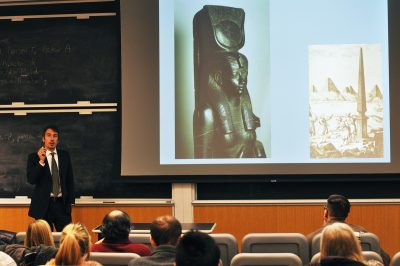
More than a dozen people gathered in the College of Arts and Sciences Monday for a lecture on Egyptian archaeology.
The presentation featured Christian Greco, the director of the Museo Egizio, or the Egyptian Museum, in Turin, Italy, and was entitled “Egyptian Museum, Turin: The Creation of a Scientific Network, Dialogue as a Tool, Research as an End,” centering around Greco’s work as the head of the museum.
The Archaeology Department at Boston University and the New England Chapter of the American Research Center in Egypt joined together to sponsor the discussion.
Rita Freed, chair of Art of the Ancient World at the Museum of Fine Arts, opened the lecture by introducing Greco and his extensive work.
“He’s the only person I know who’s published in five languages: Italian, Dutch, German, Spanish and English,” Freed said. “I’m afraid of asking which others he speaks. But there’s one language he is always speaking, and that is technology. The use of technology in his work is incredible, and it will be an honor and pleasure to hear him speak here today.”
Greco began his presentation by talking about the importance of museums and history in modern society, and how often these subjects are overlooked.
“At one time, two thirds of the annual budget … went to funding culture,” Greco said. “Italy now invests 0.8 percent of their spending on culture. So it’s a bit different, but what can you do.”
He went on to speak about how Italy’s museums are a big part of what makes it a great country. Greco said the founders of the Egyptian Museum in Turin had this in mind when they founded the museum.
“They knew Italy would be a great country if we had [this museum],” Greco said. “We would have the most important classical collection in Rome, the most important Renaissance collection in Florence and the most important Egyptian collection in Turin. And it’s true, in fact, all three cities have been Italy’s capital at one time.”
Greco has only been the director of the Egyptian Museum for three years, but is already working on major updates and new exhibits. The identity of a museum is key to its success, Greco said. But when it comes to museums, people are often resistant to change.
“We’re putting together the information, and we’re trying to make it accessible to our visitors,” Greco said. “In Italy, the average change or renovation of a museum is every 160 years, so when you try and change a museum, it is often hard to do.”
Greco said that at the end of the day, what matters most is that people are learning and being engaged when they come to the museum.
“A museum should converse with its public,” Greco said. “Each one of us is responsible for taking care of our culture, and the first part of that is learning about it.”
Several people who attended the event spoke about their excitement for Greco’s work.
Federico Zangani, a third-year Ph.D candidate at Brown University, said he interned at the Egyptian Museum in Turin this past summer and he came to Boston specifically to hear Greco’s lecture.
“I study the ancient world, their languages and ancient civilizations, and I’ve been to Egypt many times. That’s how I got interested in Egyptology,” Zangani said. “This [lecture] was very good. He’s very engaging.”
Molly Richmond, 29, of Brighton, said she came to the lecture because of her love of learning, especially about Egypt.
“I’ve been coming to these lectures for years now,” Richmond said. “I’m always curious. I always like to hear what new research is going on. Egypt has interested me since I was in fourth grade. I just love it.”
Loumona Petroff, 73, of Newton, said Greco brought an interesting perspective to one of her favorite subjects.
“I thought it was amazing, this young man going in all new directions, and so energetic,” Petroff said. “I’ve gone to a lot of Egyptian programs, but this was one of my favorites.”















Christian is a person of great value and with a modern vision; whatever enterprise he undertakes, it is winning